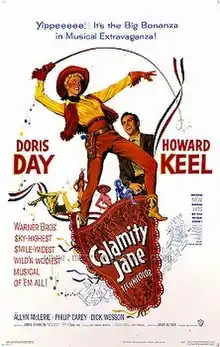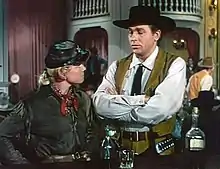| Calamity Jane | |
|---|---|
 Theatrical poster | |
| Directed by | David Butler |
| Written by | James O'Hanlon |
| Produced by | William Jacobs |
| Starring | Doris Day Howard Keel Allyn Ann McLerie |
| Cinematography | Wilfrid M. Cline |
| Edited by | Irene Morra |
| Music by | Ray Heindorf |
| Distributed by | Warner Bros. |
Release date | November 4, 1953 |
Running time | 101 minutes |
| Country | United States |
| Language | English[1] |
Calamity Jane is a 1953 American Technicolor Western musical film starring Doris Day and Howard Keel, and directed by David Butler. The musical numbers were staged and directed by Jack Donohue, who a year later would direct the Day musical, Lucky Me (1954). The film is loosely based on the life of Wild West heroine Calamity Jane (Doris Day) and explores an alleged romance between her and Wild Bill Hickok (Howard Keel).
Calamity Jane was devised by Warner Bros. in response to the success of the 1950 film Annie Get Your Gun, and won the Academy Award for Best Original Song for "Secret Love" (Sammy Fain and Paul Francis Webster), and was also Oscar-nominated for Best Music, Scoring of a Musical Picture (Ray Heindorf) and Best Sound, Recording (William A. Mueller).[2]
The songs and screenplay would form the basis of a 1961 stage musical of the same name that has had a number of productions.
Plot

In the Dakota Territory during the 1870s tough-talking, hard-riding, straight-shooting Calamity Jane rides into town on top of the Deadwood stage, wielding a rifle, and boasts, not always honestly, of her Indian-fighting exploits at a saloon where she has a "sassparilly". She has a crush on Lieutenant Gilmartin, and when survivors of an Indian attack stumble into the saloon and say he was wounded, she even risks life and limb and single-handedly saves him from an Indian war party.
Meanwhile, Deadwood's saloon owner, who sends for beautiful women entertainers to sing on stage, mistakenly hires a male, Francis (not "Frances") Fryer. Fearing a riot, the owner persuades the reluctant actor to perform in drag. Though he is initially convincing, his wig falls off, and the angry audience threatens to tear the saloon down. But Calamity calms the situation, vowing to go to Chicago and bring the renowned singer Adelaid Adams back to Deadwood. However, her friend Wild Bill Hickok expresses doubt, even scoffing at the idea, just as he scoffs at "Calam"'s relatively masculine appearance.
Calamity arrives in Chicago, where Adams is giving her farewell performance before launching a European tour. After the show ends, Adelaid gives her old costumes to her maid, Katie Brown, who dreams of becoming a singer, though Adelaid belittles her ambitions. Later, when Calamity walks in, she mistakes Katie for Adelaid. Katie, posing as Adelaid, agrees to return west with Calamity, seeing it as a chance to perform on stage.
But back in Deadwood, during Katie's premiere performance, stage fright gets the best of her. She bursts into tears, admitting she is not Adelaid Adams. With the stunned crowd on the verge of rioting, Calamity fires a shot in the air and defends Katie. She is allowed to carry on, and ultimately wins the crowd over. Meanwhile, Bill is in the audience, dressed as a "squaw" with a papoose, having lost a bet if Calamity couldn't bring Adelaid to Deadwood. When Katie reveals she is not Adelaid, Bill gets his revenge by roping Calamity and hanging her by the waist from the saloon ceiling.
Katie moves into Calamity's ramshackle cabin which they fix up together. To attract Gilmartin, Calamity, with Katie's help, dresses and behaves "ladylike". But Gilmartin and Hickok both admire Katie. At one point, they draw straws to see who will take her to the upcoming ball. Gilmartin wins, and Bill agrees to complement the double date by escorting Calamity.
At the ball, everyone is awed by Calamity's transformation. She's beautiful. But she becomes increasingly jealous watching Katie and Gilmartin together. The ball ends when Calamity angrily confronts Katie, shooting a punch glass from her hand.
A day later, though, Katie returns the favor at the saloon, albeit with the help of Bill who is the true shooter of Calamity's glass. Calamity, feeling humiliated, exits with Bill and they drive off in his wagon. A heartbroken Calamity reveals her crush on Gilmartin, while Bill admits his love for Katie. In spite of this, they passionately embrace and kiss. Calamity then realizes she loved Bill all along.
The next day, Katie takes the stagecoach to Chicago, feeling guilty over betraying her best friend. After the stage leaves, a furious Gilmartin confronts Calamity, blaming her for Katie's sudden departure. She responds by mounting her horse and riding out to overtake the stagecoach. There, she tells Katie she loves Bill, and the two women are reunited.
The story ends with a double wedding; as the stagecoach is about to leave town with the foursome, Bill asks why Calamity still has a gun. She says it's in case any more actresses come to town; all laugh, and Bill gives her gun to Fryer, before the foursome ride off, a "JUST HITCHED" sign on the back of the stagecoach.[3]
Cast
- Doris Day as Calamity Jane
- Howard Keel as Wild Bill Hickok
- Allyn Ann McLerie as Katie Brown
- Philip Carey as Daniel Gilmartin
- Dick Wesson as Francis Fryer
- Paul Harvey as Henry Miller
- Chubby Johnson as Rattlesnake
- Gale Robbins as Adelaid Adams
- Tom London as Prospector (uncredited)
Music
The score, with music by Sammy Fain and lyrics by Paul Francis Webster, includes:
- "The Deadwood Stage"
- "Hive Full of Honey"
- "I Can Do Without You"
- "It's Harry I'm Planning to Marry"
- "The Windy City"
- "Keep It Under Your Hat"
- "Higher Than a Hawk"
- "A Woman's Touch"
- "The Black Hills of Dakota"
- "Secret Love"
The music was included in the album of the same name, though some of the songs from the album were re-recorded rather than taken from the soundtrack.
Accolades
The film is recognized by American Film Institute in these lists:
- 2002: AFI's 100 Years...100 Passions – Nominated[4]
- 2003: AFI's 100 Years...100 Heroes & Villains:
- Calamity Jane – Nominated Hero[5]
- 2004: AFI's 100 Years...100 Songs:
- "Secret Love" – Nominated[6]
- 2006: AFI's Greatest Movie Musicals – Nominated[7]
Subtext
The film has been popular with some lesbian audiences for its depiction of a character which can be read as lesbian, and was screened at the London Lesbian and Gay Film Festival in 2006.[8] Film critic Jamie Stuart points to the film's lesbian overtones in Jane being played as a strong, independent woman who shares a house with a woman, the two of them painting "Calam and Katie" on its door.[8] Armond White sees the film as approaching sexuality in a way that Hollywood was not openly able to do, describing the empathy and envy (despite this resulting from conflict over a man) between Jane and Katie's characters as "a landmark display of girl-on-girl attraction."[9] Out magazine described the film's award-winning song, "Secret Love," as "the first gay anthem."[9] When asked about her award winning song being embraced by the gay community during a 2011 interview with The Advocate (magazine), Doris Day replied, "I was not aware of that, but that's wonderful."[10]
Accuracy
Though the film portrays Calamity Jane and Wild Bill Hickok as lovers, historians have found no proof that they were more than acquaintances. Jane claimed after Hickok's death that she had not only been his lover but also his wife and the mother of his child, but she offered no substantiation of her claims. Many of her contemporaries considered her a teller of tall tales (as portrayed in the film to humorous effect) who exaggerated her links to more famous frontier figures, and some insisted Hickok did not even particularly like her. But when she died decades after Hickok, friends buried her beside him at her request; four of the men on the self-appointed committee who planned Calamity's funeral (Albert Malter, Frank Ankeney, Jim Carson, and Anson Higby) later stated that, since Hickok had "absolutely no use" for Jane in this life, they decided to play a posthumous joke on him by laying her to rest by his side.[11]
References
- ↑ 'The Top Box-Office Hits of 1954', Variety Weekly, January 5, 1955
- ↑ "The 26th Academy Awards (1954) Nominees and Winners". oscars.org. Retrieved August 20, 2011.
- ↑ For music, lyrics and libretto of subsequent stage play and musical adapted after the Warner Bros Film, also see: Vocal score- "Calamity Jane (Operetta in Two Acts)" Amateur Operatic Version Warner Chappell Music Ltd copyright 2006 by Faber Music Ltd (ISBN 0-57152792-2). Libretto- "Calamity Jane A Musical Western" adapted by Ronald Hanmer & Phil Park from the stage play by Charles K. Freeman after the Warner Bros Film written by James O'Hanlon. Licensed to Josef Weinberger Ltd, London by arrangement with Tams-Witmark Music Library NYC. (Copyright 1962 by Tams-Witmark Music Library, New York. ISMN979-0-57005-498-5)
- ↑ "AFI's 100 Years...100 Passions Nominees" (PDF). Retrieved August 18, 2016.
- ↑ "AFI's 100 Years...100 Heroes & Villains Nominees" (PDF). Archived from the original (PDF) on November 4, 2013. Retrieved August 18, 2016.
- ↑ "AFI's 100 Years...100 Songs Nominees" (PDF). Archived from the original (PDF) on April 17, 2015. Retrieved August 18, 2016.
- ↑ "AFI's Greatest Movie Musicals Nominees" (PDF). Retrieved August 18, 2016.
- 1 2 Stuart, Jamie (2008). Performing Queer Female Identity on Screen: A Critical Analysis of Five Recent Films. McFarland. ISBN 9780786439713. Retrieved June 9, 2019.
- 1 2 White, Armond (June 29, 2017). "The First Gay Anthem: Calamity Jane's 'Secret Love'". www.out.com. Retrieved June 9, 2019.
- ↑ Kinser, Jeremy (December 19, 2011). "Doris Day: New Album, Fond Memories". advocate.com. Retrieved July 7, 2023.
- ↑ Griske, Michael (2005). The Diaries of John Hunton. Heritage Books. pp. 89, 90. ISBN 0-7884-3804-2.
Sources
- Rowan, Terry (1982). Western films: A complete guide (1st ed.). New York City: Rawson Associates. p. 76. ISBN 978-0892562183.
- Rowan, Terry (2016). Character-Based Film Series Part 3 (1st ed.). Raleigh, North Carolina: Lulu. p. 50. ISBN 978-1365021312.
- Rowan, Terry (2016). Character-Based Film Series Part 1 (1st ed.). Raleigh, North Carolina: Lulu. p. 235. ISBN 978-1365021282.
- Rowan, Terry (2016). Motion Pictures From the Fabulous 1950's (1st ed.). Raleigh, North Carolina: Lulu. p. 36. ISBN 978-1329760776.